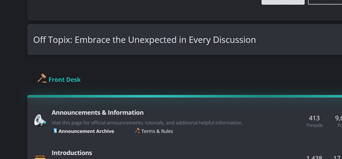In fact, I'm actually going to follow up on the above, and get way more nuanced about it.
Market Readjustment: back in the 2000s, there were a lot of forums set up that, with hindsight, shouldn't have been forums. Result: more growth than expected, leading to a harder fall in the aftermath, which makes it look worse than it ever truly was.
What do I mean by that? Well, there's no shortage of use cases that better tools came to exist to support. MMORPG guilds used to have forums, but often they were glorified calendars pointing out raid schedules, forum posts with meta builds or meta build expectations, and directions to chat services like Ventrilo, and used the forum to manage access to resources. Result: Discord came along and ate their lunch because in reality most guilds just don't need a forum and never did. A Discord server gives these groups voice chat, somewhere to document the things that they need, and while it's lacking a calendar, that's not insurmountable.
Meanwhile, things like local physical communities would find themselves a home on Facebook. This is not 'social media' winning the war as much as it is 'the network effect' - Facebook, at least in the early days, was all about connecting you with people you knew, and friends of friends. Natural network effect kicks in for local communities where you'll know local people and friends of friends are natural networks at work. Forums don't come with that built in effect, and you see this playing out even on Reddit where Facebook will win hands down for such things in a way even Reddit doesn't.
Boutique vs mall: a forum is like a boutique. What we used to call mom & pop shops. They don't stock everything, what they do stock might not be at the cheapest price, but if they have it, you can get it right there, right then. If they don't, they can probably get it for you, and they know what they're selling if you need advice. Going to social media or Reddit is like buying from Amazon, or a mall. Thousands of choices, all available instantly, but harder to care about anything, it's more sterile, guarantee they don't care if you can't get what you need, and advice is questionable at best.
And worse, the ubiquity of the Amazons and the malls have been pushing out the mom & pop stores for a while - after a while there won't be any, and then there will be nothing left but to lament what we lost, in exchange for big businesses getting bigger. (Shop at your local, owner-operated stores if you can. Once they're gone, they won't be coming back.)
The same thing is happening to communities; why start a real community building connections with other people when you can have the cheaper knock-off with less effort on Reddit or social media? Don't like the community there? Roll the dice and find another one.
The fast food effect: Social media in particular demonstrated that people don't care much about formatting, that it's more important to post and move on, with as little friction as possible. Of course it is: the quicker to get you off you writing something and the quicker they can get you to an ad. Or some other engagement whereby you raise your own value to them by teaching it better who you are, so when you do see an ad, it costs the advertiser more because it's more precisely targeted to you. Did you want a Big Mac or a McSandwich?
Then they introduced adding pictures, makes you take more notice, means that they can better see what you're taking time looking at vs moving on. Easier data gathering. Have some more fries, the salt's good for you.
And of course with the infinite scroll there's always more to see, more to consume, regardless of its taste. The point is to keep showing you things you react to, so you interact, and tune the algorithm better for maximising the value you provide when you get shown ads. Here, have your bottomless refills on soda.
I want what you're selling (market readjustment II): the other interesting factor that we don't talk about is the push in the early 2000s of the hobbyist making a buck or two. It wasn't a big deal to make a forum (or, for that matter a blog), put it out there, get people in and make a few bucks as a side hustle with ads. But that only works when you're not competing with the world and their dog. And we definitely saw a rush of people seeing that money could be made this way, that it hadn't occurred to them before, and before you know it, a gold rush was in the making. Best position to be in there was the shovel seller - Jelsoft, Invision Power Services and co certainly had shovels to sell you for the gold rush. But eventually people realise not everyone will strike it rich, not everyone will find more than a nugget; not everyone will even achieve that much. But while it lasts, it swells the market bigger than it should be - and people who wouldn't normally take notice, suddenly take notice.
------
Where am I going with all this?
If you're in the camp that forums should be more like social media, how would that play out?
Easier to post images? Easier to post videos? Hope you have a big storage plan on your server for that, because you're the one paying for it.
Better question: what's the aim of hosting images and videos? Social media wants this because it produces engagement. Not discussion, that's not the point. It produces a stream of images and videos that you can look at. And then in between the images and videos you can show an ad, bigger ad, video ad. More money on the table for that. It's all about normalising you seeing ads.
Are you going to monetise your community the same way? If not, why not? If not, is engagement a meaningful metric to be chasing? For social media, engagement is its lifeblood - but it doesn't really care what the engagement is about. Your community has a focus, dare I say it, it has a point to its existence. Social media doesn't have that, it exists to exist, it exists to drive engagement about anything and everything - as long as it lets them show you ads.
Even if hypothetically we talk about making the posting experience better for media, we need to talk about the tradeoffs. If you really want to make it as frictionless as social media does, your users have to give up control of presentation. Now, for many users that's fine, an acceptable tradeoff, but for plenty on the forum side, it's not.
Consider the side effects carefully of this: consider how rich the experience of quoting other people is, to indicate reply content, on social media. Consider moreover the notion of long-form replies basically don't exist on social media. Maybe that's the style of discussion you want, maybe it isn't, but streamlining the experience guarantees you producing more of one than the other.
What about competing with Reddit or social media on the 'everything under one roof'? You can't. Deal with it. Don't be that mom & pop cafe that isn't doing well and every time they're not doing well, they add more things to the menu so they do more things less well. Pick your niche, focus on it, be the best in your niche - be the local mom & pop shop that is the expert in the field. You cannot, and should not, be competing with Reddit because you can't compete with all of Reddit. At best, you can compete with a few subreddits that are relevant in the niche. But that's it. Similarly, you can't compete with Facebook, just the subset of Facebook Groups that overlap. Understand this. Internalise this. Pick your battles.
What about competing with social media in the dopamine addiction stakes? Sure, you can gamify content creation and content consumption, but you're unlikely to produce the recurrent effect of regular engagement that Facebook et al thrives on. That dripfeeding of reactions to content to keep you coming back, doomscrolling in the dead time between notifications, just waiting for the next drip of dopamine hitting your pleasure receptors. I don't think you can meaningfully compete with this, in the same way that fresh fruit juice is never going to compete with Coke for the #1 spot in drinks. I'm not convinced you want to, either, but that leads me to the inevitable.
Of course, then we need to talk about the dead internet theory. The dead internet theory is a position that the majority of online discourse is by bots, for bots, and that the actual number of humans talking is getting smaller and smaller every day. And with the rise of AI, I can certainly see how that might come to pass, but it's definitely been a question on my mind for some time. We've all seen the spammers, we've all seen the lurkers. One wonders how many real people are left online to post.
I wonder how close we are to a point where a majority of content is produced by bots, consumed by bots and with marginal inputs from humans leading to marginal outputs. Already people use AI to write documents, pass them to other people, who then use AI to consume the document rather than reading it - which just means we could cut half the loop and all the power consumption that we burned to do all that.
What this means for forums though? Part of me says they're the mom & pop shops of old, and that once they're gone, they're gone and that we should support them, but I wonder if we already reached the point where it doesn't matter any more. Every conversation I bump into on the nature of 'can another forum software break into the market', the answer is no.
As I said, I don't believe the problem with forums is the lack of evolution of the format. I believe the problem is the people. People don't want to talk any more, they want to shout, to proselytise. They've all been taught by social media that if you don't agree, you must disagree, that it's them and us. Social media has bred the notion that people can curate and create their own perfect echo chamber in which to have every idea reinforced and saturated in between the ads. Where's the nuanced discussion supposed to go? Answer: nowhere, because it's not feeding the machine, it's not showing them ads, it's not feeding the money cycle.
I've been building forum and community tools for many years now. I think I might finally be cured, because an increasing number of people don't want to use them. If it's not the tools they're already using, it doesn't matter. No new blood is permitted in the market - and the big players would quite like it if we all just gave up and joined them already. (And it's not about my capacity as a developer; I'm still in plenty of demand for websites and apps.)
What I find really funny is that the people most vocally decrying new tools coming into the market (shooting them down before they ever get chance), are the same people who criticise the existing tools for not being good enough. One wonders what these people imagine are the correct tools, because I suspect a number of them are using forums when perhaps they shouldn't be.
In the meantime, I'm going to try and find an alternative hobby because after all these years, it's time to set this one aside in the hopes of a better time to come when the skills will be needed again.




